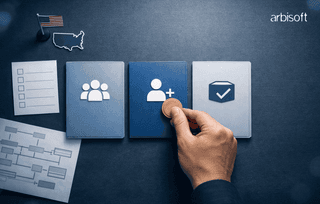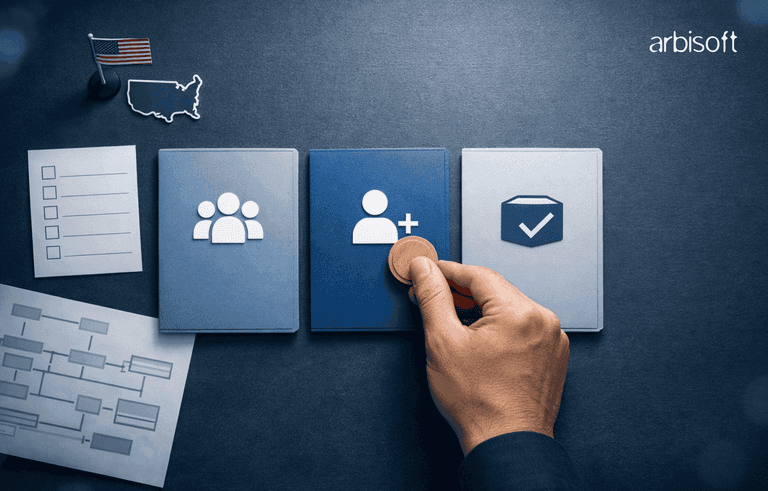We put excellence, value and quality above all - and it shows




A Technology Partnership That Goes Beyond Code

“Arbisoft has been my most trusted technology partner for now over 15 years. Arbisoft has very unique methods of recruiting and training, and the results demonstrate that. They have great teams, great positive attitudes and great communication.”
AI in Creative Industries: Revolutionizing Art, Design, Music, and Advertising for the Future

Imagine scrolling through your favorite app and coming across a stunning piece of art that instantly catches your eye, a song that feels like it was made just for you, or an ad that speaks directly to your needs.
Chances are, Artificial Intelligence had somewhat of a hand in creating all of it. AI is no longer just a tool for tech companies; it’s woven into our daily lives, shaping the way we experience music, art, design, and even the ads we see. Whether it’s Netflix recommending shows based on your preference or Spotify curating playlists to match your mood, AI is working behind the scenes, using generative models to blend creativity with technology to make our lives more personalized and engaging.
As AI continues to transform these industries, it’s becoming clear that its role in creativity is just as important as its place in technology. The creative world is being revolutionized, and we’re seeing it happen in real-time, every day, not just in traditional media but also on digital platforms through custom android app development services that bring innovative ideas to mobile audiences. Let’s explore this revolution of the creative world in more detail.
Discover how AI can simplify your workflow and take your content to the next level; all without spending a dime.

Start exploring now and see how AI can simplify your workflow, enhance your creativity, and help you produce exceptional content.

How AI is Changing Content Creation: The Good and The Bad
AI has become a key player in the creative process, helping to create everything from digital art to music and writing. But while AI is exciting for content creators, it also brings up concerns about fairness, ownership, and creativity. Let’s look at both the positive and negative effects AI is having on content creation.
AI in Art & Design
AI has made huge advances in art and design. Tools like DeepArt, Runway ML, and DALL·E allow people to create amazing images with just a few prompts. These platforms analyze millions of images to produce artwork that combines different styles or even creates entirely new visuals. What used to take days or weeks can now be done in minutes. Additionally, AI video makers are also making waves, enabling users to create engaging videos with minimal effort, turning static visuals into dynamic content.
However, there’s a downside. Many of these AI tools are trained on images without the permission of the original creators. This raises questions about whether AI is stealing ideas from human artists. Some artists feel that AI-generated art lacks the emotional depth and personal touch that come from human creativity. There are also worries that as AI art becomes more popular, the value of human-made art might decrease.
A study by Adobe shows that 62% of creative professionals say AI helps them by taking over repetitive tasks, allowing them to focus on more innovative work. But some fear that AI could replace entry-level designers, making it harder for newcomers to find work.
AI in Music
The music world has embraced AI to help create and produce music. Tools like OpenAI’s MuseNet can compose full songs in various styles, from classical to pop. AI platforms like Amper Music and AIVA even allow people without musical training to create professional-sounding tracks.
Yet, this rise of AI in music has sparked controversy. Some musicians worry that AI might take over the creative process and devalue human-made music. Also, since AI learns from existing songs, there’s concern that it might copy elements of someone else’s work without giving credit. This raises legal questions about who truly owns the music created by AI.
Despite this, AI is being used in many areas, like video games, commercials, and movies, and it’s predicted that the AI-generated music market will grow by 25% each year until 2030, according to a report from Music Ally.
AI in Writing
AI has also made waves in writing. Tools like ChatGPT and Jasper can help writers create articles, brainstorm ideas, and write marketing copy quickly. AI can be a helpful partner by drafting content and offering fresh ideas. In fact, Gartner estimates that by 2025, AI will generate over 30% of all digital content.
However, AI writing often lacks the human touch. It can sound robotic or miss out on subtle details like humor or emotion. Writers are also concerned that AI-generated content might take away jobs, especially for tasks like creating blogs or marketing materials. There’s also a risk of spreading misinformation since AI can produce content based on outdated or biased data.
AI in Advertising
In advertising, AI is proving to be incredibly useful. It helps companies create personalized ads by analyzing customer behavior and preferences. This means businesses can leverage AI and data science services to send the right message to the right audience, leading to a 30% increase in engagement and conversions, according to McKinsey.
But the precision of AI also raises privacy concerns. AI collects and uses large amounts of personal data to create tailored ads, and some people feel uneasy about how much companies know about their online behavior. There are also ethical questions about whether AI is manipulating people by showing them ads designed to influence their choices in subtle ways.
The Future of Creativity with AI
AI is clearly transforming how we create art, music, writing, and ads. On one hand, it makes life easier by taking over repetitive tasks and giving us new ideas. On the other hand, it raises concerns about ethics, privacy, and the loss of human creativity.
As AI continues to evolve, the challenge will be finding a balance. We need to ensure AI helps us without taking over the things that make human creativity special, like personal expression and originality. Clear guidelines on the ethical use of AI will be important to protect both creators and consumers.
Conclusion
AI is reshaping creative industries, offering new tools and ideas while raising important questions. It’s not about AI replacing artists, musicians, or writers; it's about AI helping them work faster, try new things, and reach more people. But it’s equally important to address the ethical concerns around copyright, privacy, and creativity.
The future of content creation looks bright, and if we can find the right balance, AI and human creators will continue to push the boundaries of what’s possible.
























